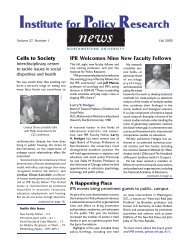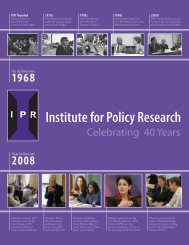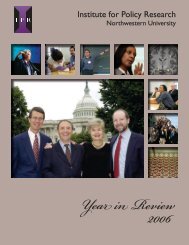Highlights of 2011 - Institute for Policy Research - Northwestern ...
Highlights of 2011 - Institute for Policy Research - Northwestern ...
Highlights of 2011 - Institute for Policy Research - Northwestern ...
Create successful ePaper yourself
Turn your PDF publications into a flip-book with our unique Google optimized e-Paper software.
per year, yet surprisingly little research has been conducted on<br />
it. Cook and Wing examine the three major studies involving<br />
voucher programs—Moving to Opportunity, Chicago Housing<br />
Authority, and Welfare to Work. The two researchers find that<br />
all three experiments resulted in small improvements in moves<br />
to better neighborhoods and housing quality; however, the<br />
program basically serves as an income-support program.<br />
IPR education economist David Figlio launched the second<br />
panel with a presentation on the pathways through which the<br />
intergenerational transmission <strong>of</strong> advantage operates and its<br />
effect on school choice and voucher programs. Related research<br />
on the effect <strong>of</strong> class on school choice and competition in<br />
France was discussed by OSC’s Agnès van Zanten, followed by a<br />
presentation by <strong>Northwestern</strong> doctoral student Dawna Goens<br />
on parent-school relationships and parent empowerment.<br />
The focus was on economic well-being in the following panel,<br />
which featured IPR economist Diane Whitmore Schanzenbach<br />
and IPR sociologist Christine Percheski. Schanzenbach<br />
discussed the long-term health and economic effects <strong>of</strong><br />
the U.S. Food Stamp Program <strong>for</strong> children, while Percheski<br />
compared and contrasted family characteristics and economic<br />
well-being in the recent recession versus the recessions <strong>of</strong><br />
the early 1980s. Additional panels analyzed the various ways<br />
class inequality influences the behavior <strong>of</strong> young people and<br />
included IPR associate Barton Hirsch, who spoke about the<br />
school-to-work transition among low-income and minority<br />
youth, <strong>Northwestern</strong> doctoral student Robert Vargas, and<br />
Agathe Voisin and Hugues Lagrange <strong>of</strong> OSC.<br />
The second day began with a joint presentation by OSC’s<br />
Philippe Coulangeon and Mirna Safi on the social mobility <strong>of</strong><br />
second-generation immigrants in France, and then economist<br />
Joseph Ferrie, an IPR associate, discussed his research on<br />
lead exposure, SES, and cognitive disparities. The next panel<br />
discussed the various ways in which inequality impacts urban<br />
areas with presentations by IPR political scientist Wesley G.<br />
Skogan on his work examining neighborhood context and<br />
crime, as well as Bruno Cousin <strong>of</strong> the University <strong>of</strong> Lille 1, who<br />
examined refounded neighborhoods, and OSC director Alain<br />
Chenu, who discussed social capital loss and political abstention.<br />
IPR sociologist James Rosenbaum and IPR graduate research<br />
assistant Kelly Iwanaga Becker each presented a lecture on ways<br />
to reduce inequality in college enrollment rates that resulted<br />
from a recent study examining the ways different high schools<br />
handle the college application process. Inequality in relation to<br />
child welfare was discussed next—first by IPR law pr<strong>of</strong>essor<br />
Dorothy Roberts, who discussed how child welfare systems<br />
in the United States disproportionately affect minorities, and<br />
then by Mathieu Ichou, a doctoral student from OSC, who<br />
focused on inequities <strong>for</strong> children who have immigrated to<br />
France. The workshop’s last panel included a presentation from<br />
IPR associate and education researcher James Spillane on ways<br />
in which urban students are perceived, and concluded with a<br />
comparison <strong>of</strong> social mobility experiences in France, India, and<br />
the United States by OSC postdoctoral fellow Jules Naudet.<br />
French researcher Bruno Cousin (center) <strong>of</strong> the University <strong>of</strong> Lille<br />
neighborhoods at the IPR/OSC comparative workshop on inequalities<br />
Quillian co-organized the workshop with Figlio and OSC’s<br />
Oberti. The Partner University Fund <strong>of</strong> the FACE Foundation,<br />
NYC supported the workshop.<br />
Housing Policies and Crime<br />
Skogan was part <strong>of</strong> a research team that completed a study to<br />
determine whether public housing relocatees have a significant<br />
impact on crime in the neighborhoods they move to when<br />
using housing vouchers. Commissioned by the Chicago Housing<br />
Authority, the researchers examined the moves <strong>of</strong> Plan <strong>for</strong><br />
Trans<strong>for</strong>mation housing voucher recipients from 1999 to 2008,<br />
collecting 25,000 data points from 813 different census tracts.<br />
They tracked those who moved in or out <strong>of</strong> a census tract<br />
on a quarterly basis and then looked at crime in the same<br />
tract in the ensuing quarter and plugged this in<strong>for</strong>mation into<br />
a regression model. In both Chicago and Atlanta, which they<br />
also studied, they found citywide decreases in violent, gun, and<br />
property crime. Crime in neighborhoods where the public<br />
56 INSTITUTE FOR POLICY RESEARCH

















